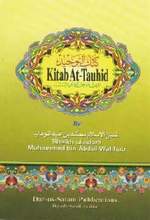Kitab At-Tauhid (The Oneness of Allah)

CHAPTER No: 39
(Seeking judgement from other than Allah and His
Messenger is hypocrisy)
Allah the Most Exalted said:
"Have you seen those (hypocrites) who claim that they believe in that which has been sent down to you, and that which was sent down before you, and they wish to go for judgement (in their disputes) to the Taghut (false judges etc.) while they have been ordered to reject them? But Satan wishes to lead them far astray."
(4:60)
"And when it is said to them: "Come to what Allah has sent down and to the Messenger (Muhammad P.BU.H)," you (Muhammad P.B.U.H,) see the hypocrites turn away from you (Muhammad P.B.U.H) with aversion."
(4:61)
"How then, when a catastrophe befalls them because of what their hands have sent forth, they come to you swearing by Allah, "We meant no more than goodwill and conciliation!"
(4:62)
He the Almighty said:
"And when it is said to them: 'Make not mischief on the earth,' they say: 'We are only peace-makers.' "
(2:11)
Allah the Exalted said:
"And do not do mischief on the earth, after it has been set in order, and invoke Him with fear and hope; Surely, Allah's Mercy is (ever) near unto the good-doers."
(7:56)
Allah the Almighty said:
"Do they then seek the judgement of (the Days of) Ignorance? And who is better in judgement than Allah for a people who have firm Faith."
(5:50)
Abdullah bin Amr bin Al-'Aas (May Allah be pleased with him) narrated that Allah's Messenger (May the peace and blessing of Allah be upon him) said:
"None of you truly believes until his desires are in accordance with what I came with." [An-Nawawi graded this Hadith as Sahih and recorded in Kitab Al-Hujjah with a sound chain of narrators.]
Sha'bi said: "There was a dispute between a Jew and a Munafiq (hypocrite). The Jew said: 'Let us seek a judgement from Muhammad; for he knew that he (May the peace and blessing of Allah be upon him) does not take bribes. The hypocrite said: 'Let us get a judgement from the Jews', because he knew they accepted bribes. Thus, both of them agreed to take their case to a soothsayer in Juhainah. It was on this occasion the verse:
'Have you seen those who claim...' (4:60) was revealed".
Some said that there was a dispute between two men. One of them said: "Let us take the dispute to the Prophet (May the peace and blessing of Allah be upon him) for his judgement" but the other said: "Take it to Ka'b bin Al-Ashraf'. Thereafter both of them came 'to Umar (May Allah be pleased with him) One of them told him the story so he asked the other who was not content to take the case to Prophet (May the peace and blessing of Allah be upon him) "It is so (as the other said)?" He said, "Yes". He then (Umar (May Allah be pleased with him) ) struck him with his sword and killed him.
Important issues of the Chapter
1) Explanation of the verse in An-Nisa' (4:60) with the emphasis on the understanding of Taghut.
2) Explanation of the verse in Al-Baqarah (2:11):
"And when it is said to them: Make not mischief on the earth"
3) Explanation of the verse in Al-A’raf (7:56):
"And do not do mischief on the earth, after it has been set in order...."
4) Explanation of the verse in Al-Mai’dah (5:50):
"Do they then seek the judgement of (the Days of) Ignorance?"
5) The statement of Sha'bi (May Allah be pleased with him) on the occasion of revelation of the Verse 4:60.
6) The difference between true lman, and the false and feigned Belief.
7) The incidence of Umar (May Allah be pleased with him) with the Munafiq (hypocrite).
8) Nobody attains lman (Belief) until his all desires are in accordance with what Allah's Messenger (May the peace and blessing of Allah be upon him) came with
